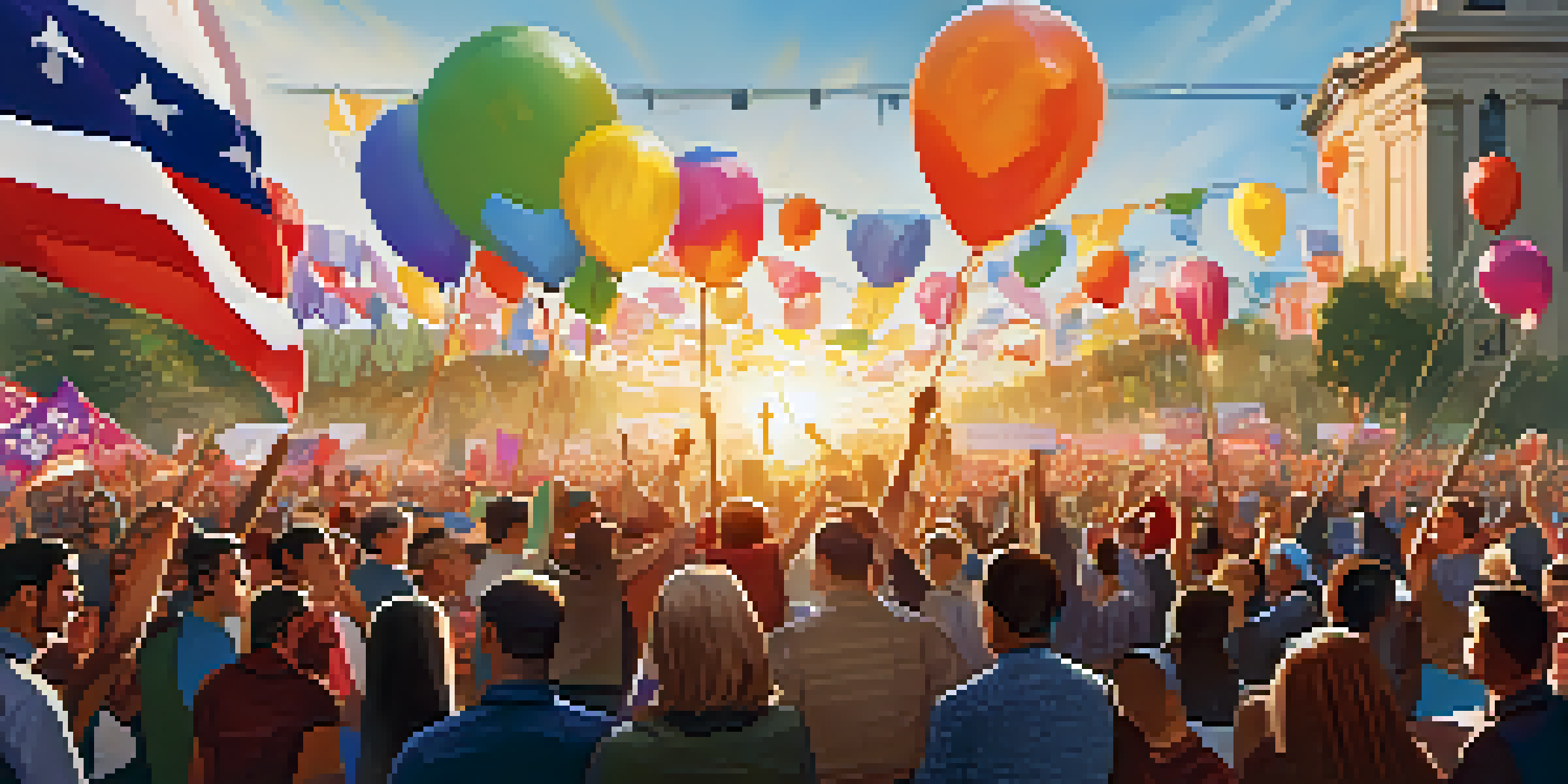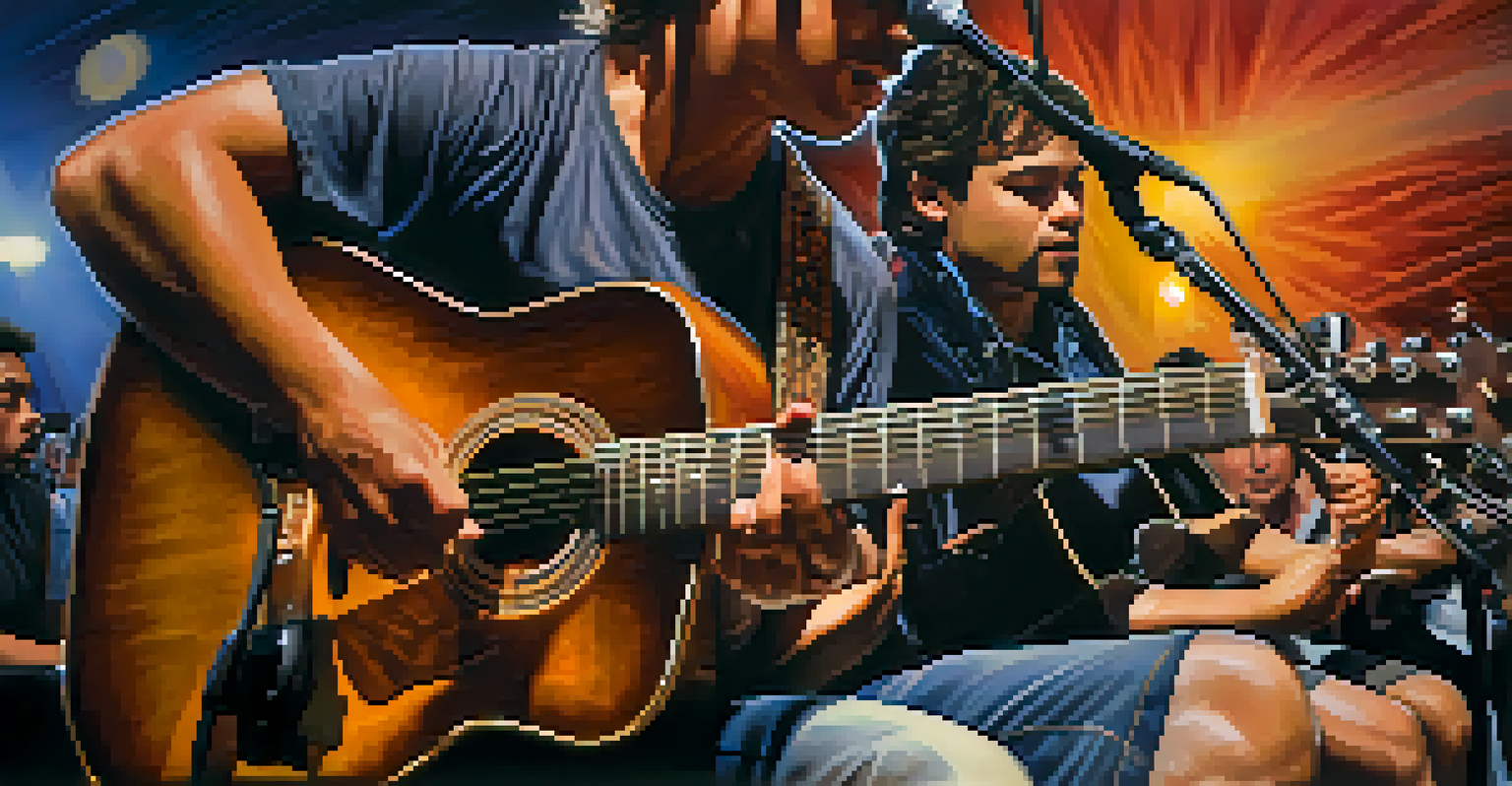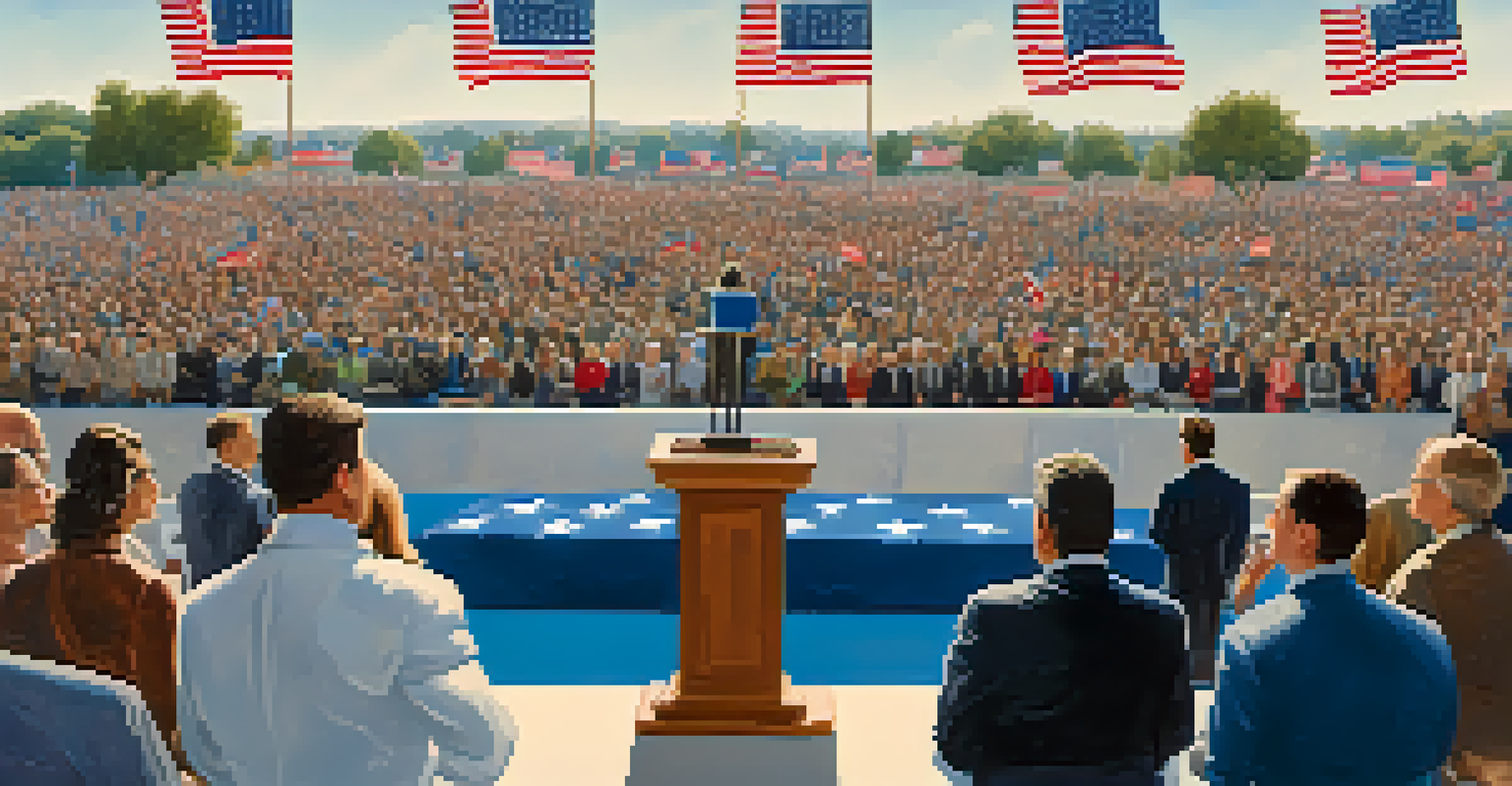How Music Influences Nonverbal Communication in Politics

The Role of Music in Political Campaigns
Music has long been a staple in political campaigns, serving as a powerful tool to evoke emotions and create memorable moments. From rallying an audience to establishing a candidate's brand, the right tunes can amplify a message far beyond spoken words. Think about how campaigns often use anthems that resonate with their values, instantly creating a connection with voters.
Music is the shorthand of emotion.
For example, consider Barack Obama's use of 'Yes We Can' as a rallying cry, which was complemented by upbeat and inspiring music. This not only encouraged unity but also motivated supporters, making them feel part of something larger. The music set the tone, enhancing the emotional weight of his speeches and visuals.
In this way, music acts as a nonverbal cue, signaling energy, hope, or urgency, depending on the context. It adds layers to the communication, allowing politicians to convey their messages without uttering a single word. The strategic use of music can often be the difference between a forgettable campaign and a memorable one.
Emotional Resonance of Music and Its Impact
One of the most profound effects of music lies in its ability to evoke emotions. In politics, where feelings often drive decisions, using music strategically can enhance nonverbal communication. The melodies, rhythms, and lyrics can stir passion, nostalgia, or even anger, aligning the audience's emotional state with the political message being delivered.

Take, for instance, the use of national anthems during political events. These pieces can instill a sense of pride and belonging, reinforcing national identity while simultaneously uniting people under a shared cause. This emotional resonance can amplify a politician's nonverbal cues, making gestures and expressions more impactful.
Music Enhances Political Messaging
Strategically chosen music can amplify a candidate's message, creating emotional connections with voters.
Moreover, the choice of music can also shape perceptions of a candidate's personality. Upbeat and lively tunes may suggest approachability and optimism, while somber music might convey seriousness and reflection. Thus, the emotional weight of music seamlessly intertwines with the nonverbal signals being sent.
Cultural Differences in Music and Messaging
Music doesn't just communicate emotions; it also carries cultural significance that can differ greatly across regions. In politics, understanding these cultural nuances is crucial for effective nonverbal communication. What resonates with one demographic may not have the same impact on another, necessitating a tailored approach to music in political discourse.
Without music, life would be a mistake.
For example, in some cultures, traditional folk music may evoke nostalgia and community spirit, while in others, contemporary pop might resonate with younger voters. Politicians can leverage these cultural connections to align their nonverbal messages with the values and sentiments of specific groups, making their communication more effective.
Failure to recognize these cultural differences can lead to misinterpretations or even backlash. Therefore, a candidate's choice of music should be a reflection of their audience's identity, ensuring that the nonverbal cues they send remain relevant and relatable.
The Psychology of Music and Nonverbal Cues
The psychological impact of music is deeply intertwined with nonverbal communication. Research shows that music can significantly alter our perception of a speaker's message, influencing how we interpret body language and facial expressions. A politician's choice of music can create an atmosphere that enhances or detracts from their intended nonverbal cues.
For instance, playing suspenseful music during a speech can heighten tension, making gestures appear more dramatic and impactful. Conversely, light-hearted music may promote relaxation, allowing for a more approachable demeanor. This interplay between music and nonverbal communication can lead to a more profound connection with the audience.
Cultural Nuances Shape Music Choice
Understanding cultural differences is crucial for politicians to select music that resonates with diverse voter demographics.
Understanding this psychological relationship can empower politicians to craft messages that resonate more effectively. By selecting music that complements their nonverbal expressions, they can create an immersive experience that captivates and engages voters.
Music as a Tool for Rallying Support
Music has an unparalleled ability to rally support and create movements. Political rallies often feature songs that inspire collective action, turning individual emotions into a shared experience. When people sing or chant together, they not only express support but also reinforce their commitment to a cause, enhancing the nonverbal signals of unity and solidarity.
An excellent example of this is the use of protest songs throughout history. From 'We Shall Overcome' during the Civil Rights Movement to more contemporary anthems supporting various social causes, these songs have empowered communities to come together and march towards a common goal. The shared experience of music amplifies both verbal and nonverbal communications of hope and resilience.
Thus, music becomes a rallying cry, a way to forge connections among people who might otherwise feel isolated. It transforms political gatherings into powerful spectacles where nonverbal cues of enthusiasm and determination are palpable.
The Influence of Music in Debates and Speeches
In debates and speeches, music's influence can be subtle yet significant. While the spoken word takes center stage, the background music or sound design can shape audience perceptions and reactions. This nonverbal layer can enhance or undermine a politician's message, making it essential to consider how music is integrated into these events.
For instance, the use of dramatic music during pivotal moments in a speech can amplify the impact of key messages. It can create a sense of urgency or gravitas, guiding the audience's emotional responses and aligning them with the speaker's intentions. This strategic use of sound can make an otherwise ordinary speech memorable.
Music Fosters Unity and Support
Music serves as a powerful rallying tool, transforming individual emotions into collective action during political movements.
Conversely, poorly chosen music can distract or detract from the message. If the music feels out of sync with the tone of the speech, it can lead to confusion or disengagement. Thus, the careful selection of musical elements in debates and speeches is crucial for reinforcing nonverbal communication.
Looking Ahead: The Future of Music in Politics
As technology evolves, so too does the role of music in politics. With the rise of social media and digital platforms, music can be disseminated rapidly, reaching wider audiences than ever before. This shift presents new opportunities for politicians to utilize music in innovative ways, enhancing their nonverbal communication strategies.
In the future, we may see more personalized music experiences, where voters engage with tailored playlists that resonate with their beliefs and values. This could create a deeper emotional connection, transforming how political messages are received. Additionally, the fusion of music with visual media, like videos and livestreams, can further amplify nonverbal signals.

Ultimately, the interplay between music and nonverbal communication will continue to evolve, shaping the political landscape. As politicians and campaigns adapt to these changes, music will remain a vital tool in crafting resonant and impactful messages.